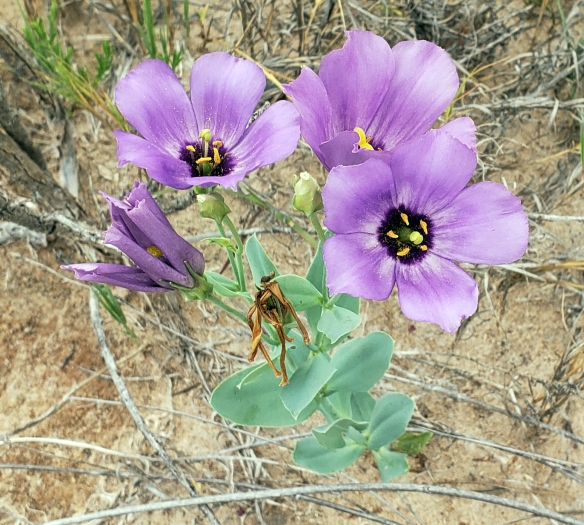Texas Bluebells
(Eustoma exaltatum subsp. russellianum)
Texas Bluebells (Eustoma exaltatum subsp. russellianum)
/
/

© aarongunnar
CC BY 4.0
Image By:
© aarongunnar
Recorded By:
Copyright:
CC BY 4.0
Copyright Notice:
Photo by: © aarongunnar | License Type: CC BY 4.0 | License URL: http://creativecommons.org/licenses/by/4.0/ | Uploader: aarongunnar | Publisher: iNaturalist |



















































Estimated Native Range
Summary
Eustoma exaltatum subsp. russellianum, commonly known as Texas Bluebells, is a semi-deciduous perennial or annual herb. It is native to prairies, meadows, and open fields in the South Central United States. This plant typically grows to a height of 1-3 feet (0.3-0.9 meters) and a width of 0.8-1 feet (0.2-0.3 meters). Texas Bluebells have a bushy habit with deep green, lance-shaped leaves. The showy flowers are large, bell-shaped, and come in shades of blue, pink, and purple, blooming profusely in the summer and early fall.
Texas Bluebells are valued for their vibrant and long-lasting flowers, which make them popular in ornamental gardens, borders, and as cut flowers. They are relatively easy to maintain, requiring minimal care once established. In cultivation, they thrive in full sun and prefer well-drained soil, although they can tolerate low or medium water conditions. While they are not typically prone to serious diseases or pests, overwatering can lead to root rot. They are not known for aggressive roots or invasiveness. Gardeners should note that Texas Bluebells can self-seed under optimal conditions, potentially naturalizing in the garden.CC BY-SA 4.0
Texas Bluebells are valued for their vibrant and long-lasting flowers, which make them popular in ornamental gardens, borders, and as cut flowers. They are relatively easy to maintain, requiring minimal care once established. In cultivation, they thrive in full sun and prefer well-drained soil, although they can tolerate low or medium water conditions. While they are not typically prone to serious diseases or pests, overwatering can lead to root rot. They are not known for aggressive roots or invasiveness. Gardeners should note that Texas Bluebells can self-seed under optimal conditions, potentially naturalizing in the garden.CC BY-SA 4.0
Plant Description
- Plant Type: Herb
- Height: 1-3 feet
- Width: 0.8-1 feet
- Growth Rate: Moderate
- Flower Color: Blue, Purple
- Flowering Season: Summer, Fall
- Leaf Retention: Semi-Deciduous
Growth Requirements
- Sun: Full Sun
- Water: Low, Medium
- Drainage: Slow, Medium
Common Uses
Bee Garden, Bird Garden, Border Plant, Butterfly Garden, Deer Resistant, Drought Tolerant, Showy Flowers
Natural Habitat
native to prairies, meadows, and open fields in the South Central United States
Other Names
Common Names: Showy Prairie Gentian, Bluebells, Prairie Gentian
Scientific Names: , Eustoma exaltatum subsp. russellianum, Eustoma grandiflorum, Eustoma russellianum, Eustoma gracile, Eustoma grandiflorum f. grandiflorum, Eustoma grandiflorum f. flaviflorum, Eustoma russellianum f. fisheri, Urananthus russelianus, Eustoma andrewsii
GBIF Accepted Name: Eustoma exaltatum subsp. russellianum (Hook.) Kartesz